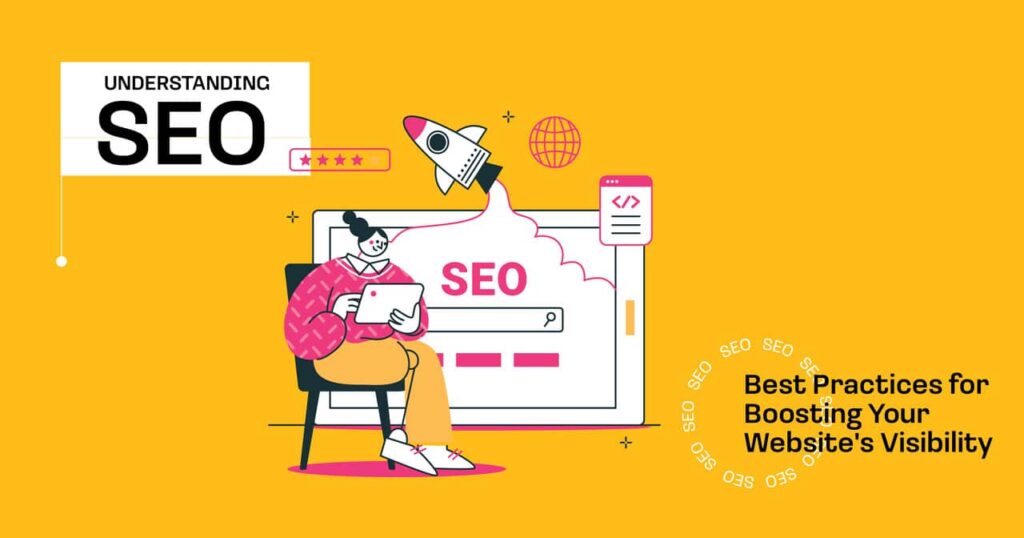In today’s digital world, having a well-optimized website is crucial for standing out in the crowded online marketplace. If you’re wondering how to make your website more visible to search engines and attract organic traffic, you’ve come to the right place.
Essential Takeaways
- Define and Document Your SEO Strategy: Identify your target keywords, content goals, and technical requirements. Documenting your strategy helps maintain consistency and focus, which are crucial for successful SEO campaigns.
- Focus on Quality and Relevance: Prioritize creating high-quality, relevant content and acquiring authoritative backlinks. Quality content and strong backlinks are key to improving your search engine rankings.
- Monitor and Adapt: Regularly track your SEO performance using metrics and analytics tools like Google Analytics and Google Search Console. Be prepared to adapt your strategy based on data insights and changing search engine algorithms to stay competitive.
This guide will walk you through the essentials of SEO (Search Engine Optimization), offering practical tips and best practices to help you boost your website’s visibility and improve your search engine ranking.
What is SEO and Why Does It Matter?
Defining SEO
SEO, or Search Engine Optimization, is the art and science of enhancing your website to make it more attractive to search engines like Google. The goal is to improve your site’s visibility in search engine results pages (SERPs) so that users can find your website more quickly when they search for relevant topics or keywords. Think of SEO as a way to make your website more discoverable and engaging to both search engines and users.
The Importance of SEO for Online Success
In an age where almost everyone turns to Google or other search engines for answers, SEO is essential for driving organic traffic to your website. Unlike paid advertising, which stops delivering results once you stop paying, SEO works continuously to bring in visitors without ongoing costs. By optimizing your site, you ensure that it appears in relevant searches, which can significantly impact your business growth and online presence.
Key Components of SEO
On-Page SEO Best Practices
High-quality, relevant content is the backbone of effective SEO. Search engines aim to provide users with the most useful and relevant results for their queries, so your content must align with what users are searching for. Here’s how you can optimize your content:
- Keyword Research: Start by identifying keywords your target audience is searching for. Tools like Google Keyword Planner or Ahrefs can help you find these keywords. Aim for a mix of short-tail and long-tail keywords to cover a broad range of search intents.
- Keyword Placement: Incorporate your chosen keywords naturally into your content. This includes using them in your headings, subheadings, body text, and meta descriptions. Avoid keyword stuffing, which can negatively impact your ranking and readability.
- Content Freshness: Regularly update your content to keep it relevant and accurate. Fresh content signals to search engines that your site is active and up-to-date, which can improve your rankings.
Crafting SEO-Friendly Meta Tags
Meta tags, including meta titles and descriptions, are critical in how your site appears in search results. They should be optimized to attract clicks and provide a clear idea of what your page is about:
- Meta Titles: Your meta title should be concise, include your primary keyword, and be engaging enough to entice users to click. Aim for a length of 50-60 characters to ensure it displays fully in search results.
- Meta Descriptions: This is a summary of your page content that appears below the title in search results. Include relevant keywords and a compelling call to action (CTA) to encourage users to visit your site. Keep it under 160 characters to avoid truncation.
Improving User Experience (UX)
A good user experience is essential for SEO and overall site performance. Here’s what to focus on:
- Mobile-Friendliness: With mobile traffic rising, ensure your website is responsive and looks good on all devices. Google uses mobile-first indexing, meaning your mobile site’s performance directly affects your rankings.
- Page Load Speed: A slow-loading site can frustrate users and lead to higher bounce rates. Use tools like Google PageSpeed Insights to test your site’s speed and make necessary improvements, such as optimizing images and leveraging browser caching. Lazy loading images can also improve loading times significantly.
- Navigational Structure: A well-organized site structure makes navigating easier for users and search engines. Use clear headings and subheadings, and ensure your internal links guide users to relevant pages.
Off-Page SEO Strategies
Building Quality Backlinks
Backlinks, or inbound links from other websites, are a significant factor in SEO. They act as endorsements of your site’s credibility and authority:
- Guest Blogging: Write articles for reputable sites in your industry to earn backlinks. This also helps you reach new audiences and build your brand’s authority.
- Partnerships: Collaborate with other businesses or influencers to create content that includes backlinks to your site.
- Content Marketing: Create high-quality, shareable content that naturally attracts backlinks from other sites. This can enhance your online visibility and improve your search rankings.
Leveraging Social Media
Social media can indirectly impact your SEO efforts by driving traffic and engagement:
- Share Your Content: Use social media platforms to promote your content and drive traffic to your website. Engaging posts and updates can increase visibility and encourage shares.
- Engage with Your Audience: Build relationships with your followers and respond to comments or questions. This interaction can enhance your brand’s reputation and drive more traffic.
Engaging with Online Communities
Participate in forums, Q&A sites, and industry-specific communities to build your authority:
- Forums: Join discussions on platforms like Reddit or industry forums. Provide valuable insights and link back to your content when relevant.
- Q&A Sites: Answer questions on sites like Quora, linking to your content when it adds value to the discussion.
Technical SEO Essentials
Ensuring Crawlability and Indexability
For search engines to index your site, it must be crawlable:
- Robots.txt File: This file instructs search engine bots on which pages to crawl and index. Ensure it’s properly configured to allow access to important pages.
- XML Sitemap: Create and submit an XML sitemap to Google Search Console. This helps search engines discover and index your pages more efficiently.
Optimizing Site Structure and URL Hierarchy
A clear site structure and URL hierarchy make it easier for search engines and users to navigate:
- URL Structure: Use descriptive, SEO-Friendly URL Structures that reflect the page’s content. Avoid using long, complex URLs with unnecessary parameters.
- Site Map: A well-organized site map helps search engines understand your site’s structure and find essential pages.
Implementing Schema Markup
Schema markup is code that helps search engines understand the content of your pages:
- What is Schema Markup? Schema markup provides additional information about your content, such as reviews, ratings, and events, which can enhance your search listings.
- How to Implement Schema Markup: Use tools like Google’s Structured Data Markup Helper to add schema markup to your site. This can improve the visibility and attractiveness of your search results.
Advanced SEO Techniques
Conducting SEO Audits
Regular SEO audits help identify issues and opportunities for improvement:
- Performing an SEO Audit: Use tools like SEMrush, Moz, or Google Search Console to analyze your site’s performance. Look for issues related to technical SEO, on-page factors, and off-page factors.
- Analyzing and Fixing SEO Issues: Address common issues such as broken links, duplicate content, and poor site speed. Use audit results to refine and optimize your SEO strategy.
Local SEO Best Practices
For businesses with physical locations, local SEO is crucial:
- Optimizing for Local Search: Claim and optimize your Google Business Profile. Ensure your business information is accurate and complete, and encourage customer reviews.
- Building Local Citations: Ensure your business is listed consistently across local directories and review sites. This helps improve your local search visibility.
Measuring SEO Success
Key SEO Metrics to Track
Tracking metrics helps evaluate the effectiveness of your SEO efforts:
- Organic Traffic: Monitor the number of visitors coming from search engines. Tools like Google Analytics can provide insights into traffic sources and user behavior.
- Keyword Rankings: Track your keyword rankings to see how well your pages perform for targeted search terms. This includes monitoring keyword volume and keyword difficulty.
- Conversion Rates: Measure how well your SEO efforts, such as leads or sales, drive conversions. This helps assess the ROI of your SEO strategy.
Adjusting Your Strategy Based on Data
Use data to inform and adjust your SEO strategy:
- Interpreting SEO Data: Analyze performance metrics to identify trends and areas for improvement. Look for patterns in traffic, engagement, and conversion data.
- Making Data-Driven Adjustments: Make informed changes to your SEO strategy based on your analysis. This might involve updating content, improving site speed, or adjusting keyword targeting.
Conclusion
Integrate on-page, off-page, and technical SEO practices into a cohesive strategy to achieve optimal results. Consistency and ongoing optimization are vital in maintaining and improving your website’s search engine visibility.
Call to Action
Ready to elevate your website’s visibility and drive more traffic? Contact us today for a personalized SEO consultation. Let’s work together to implement these best practices and watch your online presence thrive!
FAQs
1. What is the difference between on-page and off-page SEO?
On-page SEO refers to optimizations you make directly on your website, such as content quality, meta tags, and site structure. Off-page SEO involves building your site’s authority and reputation, such as acquiring backlinks and engaging on social media.
2. How long does it take to see results from SEO efforts?
SEO is a long-term strategy. Generally, you may see noticeable improvements in search rankings and traffic within 3 to 6 months, though it can vary based on competition and the effectiveness of your strategy.
3. What are some common SEO mistakes to avoid?
Common mistakes include keyword stuffing, neglecting mobile optimization, using duplicate content, and ignoring technical SEO issues. Avoiding these pitfalls will help improve your SEO performance.
4. How often should I update my website’s content for SEO?
Regular updates are essential to keep your content relevant and engaging. Aim to review and update your content every few months or more frequently if there are significant changes in your industry or business.
5. What role does mobile optimization play in SEO?Mobile optimization is crucial because search engines like Google use mobile-first indexing. Your site’s mobile version is considered for rankings and indexing, so ensuring a responsive and user-friendly mobile experience is essential.









